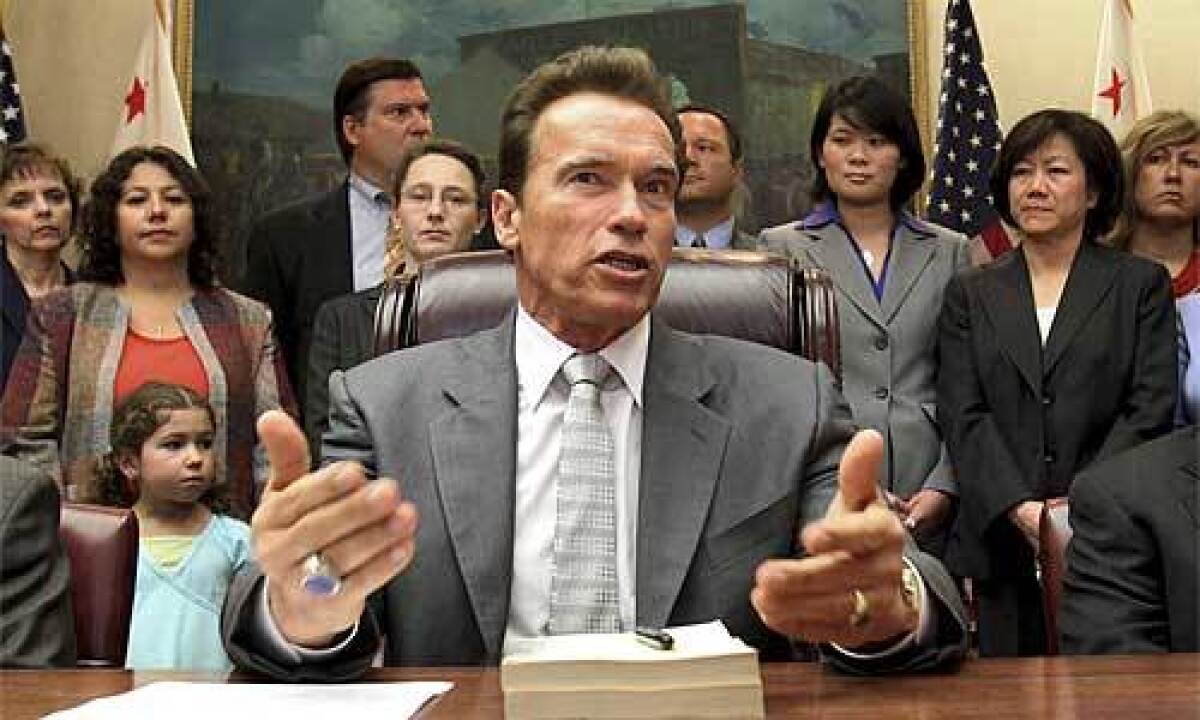Schwarzenegger cuts $500 million more as he signs budget

Reporting from Sacramento — Gov. Arnold Schwarzenegger on Tuesday signed a budget plan sent to him by lawmakers to close the state’s monumental deficit, using his veto pen to impose nearly $500 million in additional cuts.
The new reductions will affect child welfare and children’s healthcare, the elderly, state parks and AIDS treatment and prevention, going beyond the dramatic cuts that were part of the deal Schwarzenegger negotiated with legislative leaders.
Democratic leaders in the Assembly and Senate reacted angrily to his use of the line-item veto, disputing the Republican governor’s authority to wield that power in this situation and portraying him as callous.
Schwarzenegger’s aides said the cuts were proper, and the governor said they were necessary.
“This has been a very tough budget, probably the toughest since I have been in office here in Sacramento,” Schwarzenegger said. “This budget is kind of like the good, the bad and the ugly.”
The good, the governor said, is that the plan does not raise taxes and includes changes he says will make government more efficient, such as reorganizing and abolishing some boards and commissions.
The bad are the deep cuts to state programs that will touch millions of Californians, particularly its most vulnerable citizens, he said.
The ugly, Schwarzenegger added, are the new reductions he made because lawmakers left town after failing to fully close the state’s deficit.
The Assembly on Friday capped a 20-hour session by rejecting provisions worth $1.1 billion that had been agreed to by the governor and legislative leaders.
The extra cuts the governor made Tuesday -- $489 million -- took nearly $80 million that pays for workers who help abused and neglected children; $50 million from Healthy Families, which provides healthcare to children in low-income families; $50 million from services for developmentally delayed children under age 3; $16 million from domestic-violence programs; and $6.3 million from services for the elderly. Among other reductions was $6.2 million more from parks, which could result in the closure of 100, rather than 50, of California’s 279 state parks.
In addition, Schwarzenegger effectively gutted a program that provides local governments with funding to encourage property owners to preserve open space and to use land for agriculture.
Ted Lempert, president of Children Now, an advocacy group, called the cut to Healthy Families “particularly galling.” He said a coalition, including his group, is spearheading a campaign to put a universal children’s healthcare measure on the fall 2010 ballot.
“A struggling family puts their kids first,” Lempert said. “What the governor and what the state has done is the opposite.”
Assembly Speaker Karen Bass (D-Los Angeles) and Senate leader Darrell Steinberg (D-Sacramento), in questioning the legality of Schwarzenegger’s moves, suggested that the governor’s veto power can be used only on original appropriations. The new spending plan is a revision of a budget Schwarzenegger and lawmakers ratified in February.
Both leaders said they would attempt to restore the cuts when they return from recess, in mid-August, and Bass said she would seek an opinion from the Legislature’s legal office.
In a long and harsh statement to the media, Bass called the governor “so eager to tear down the safety net that he appears willing to break the law to do it.” She faulted Schwarzenegger for rejecting taxes that Democrats proposed on “big oil and big tobacco” and instead attacking “the sick, the young, the elderly and battered women.”
In response, Schwarzenegger’s aides said Bass and the Assembly had forced his hand.
“The governor understands how difficult these cuts are,” said his spokesman, Aaron McLear. “But because the speaker sent him an unbalanced budget, he had no choice but to make these cuts.”
Assembly lawmakers turned down a plan to seize $1 billion in gas tax money that belongs to local governments and rejected a new offshore oil drilling project that could have produced $100 million in royalties.
The Senate approved the entire budget deal, including those measures, early Friday morning.
By killing the two proposals, lawmakers wiped out a reserve fund the governor has insisted upon to cushion future shortfalls. His aides said the cuts announced Tuesday would allow the state to put aside $500 million.
Even as he signed the plan, Schwarzenegger warned that the state’s troubles were not over. Finance officials are already predicting future deficits, and the governor said he was ready, “if our revenues drop further, to make the necessary cuts and live within our means.”
Overall, the new budget is expected to fundamentally alter life for many Californians, with reductions to K-12 education, state colleges and universities, healthcare and public assistance for the elderly and the poor.
It appropriates billions of dollars from local governments, which could force cities and counties to further reduce their own spending on roads, law enforcement and other services.
The package was approved to address a deficit that administration officials previously projected at $26.3 billion. Schwarzenegger’s aides now say that, although the budget plan contains $24 billion in solutions, it will close the entire shortfall because of changing revenue forecasts, a recalibration of education funding formulas and a decision to reduce the reserve fund.
The plan’s cuts, accounting maneuvers and other measures should soon enable California to resume paying all of its bills again. From July 2 until the end of the day Monday, the state had issued 209,219 IOUs worth $1.09 billion, according to Garin Casaleggio of the state controller’s office.
The state’s credit rating has declined to nearly junk status after two months during which elected officials could not agree on how to resolve the crisis.
shane.goldmacher @latimes.com
More to Read
Sign up for Essential California
The most important California stories and recommendations in your inbox every morning.
You may occasionally receive promotional content from the Los Angeles Times.










